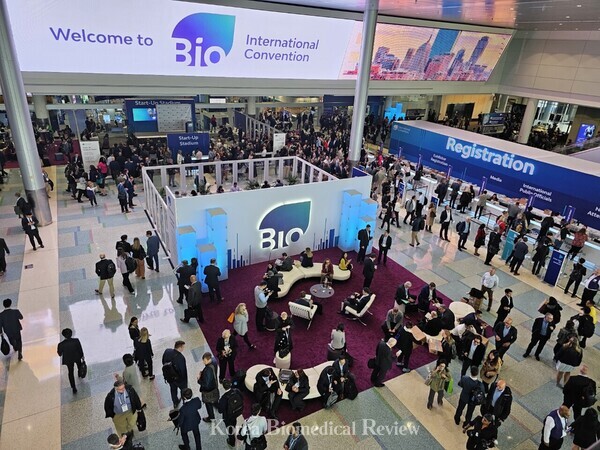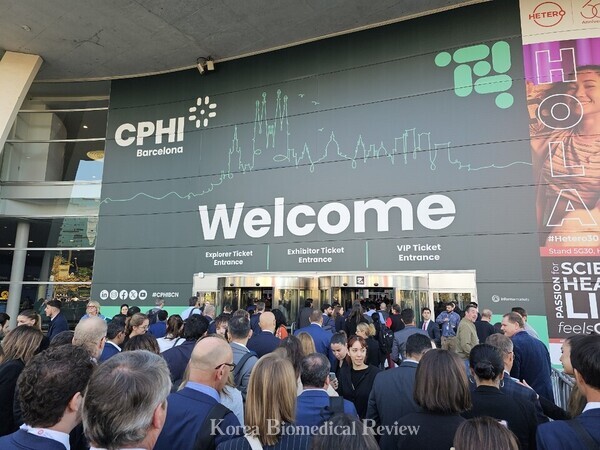The year 2023 marked significant transformations in the medical and pharmaceutical sectors. Despite facing resistance from the medical community, President Yoon Suk Yeol's administration declared its intention to increase the number of medical school seats starting in 2025. Additionally, 2023 witnessed the opening of the digital therapeutics market. The initiation of telemedicine this year led to an ongoing conflict between the medical community, opposing such practices, and the Ministry of Welfare, advocating for them, expected to persist into 2024. In the pharmaceutical industry, numerous domestic companies ventured into the global market. Korea Biomedical Review has compiled the 10 most noteworthy healthcare developments in 2023. -- Ed.
The year 2023 marked a significant year for the operations of domestic pharmaceutical and biotech companies, as they could attend overseas exhibitions after Covid-19 eased from a pandemic to an endemic.
Korean companies actively participated in various events, including the BIO International Convention and the Convention on Pharmaceutical Ingredients (CPHI) Worldwide 2023, making presentations and holding meetings.

BIO International Convention, the world’s largest comprehensive biotech convention, attended by about 8,000 companies from 65 countries annually, rotates through major biotech clusters in the United States. This year's event, held in Boston, Mass., known as the world's largest biotech cluster, was particularly meaningful.
Cambridge Innovation Center (CIC) in Boston, known as the cradle of open innovation, houses several Korean companies, including Korea Health Industry Development Institute, Yuhan USA, Dong-A ST, JW Pharmaceutical, Ildong Pharmaceutical, Huons, MediSapiens, Abion Bio, Genuv, HanAll Biopharma, and others.
This year’s event was attended by companies focusing on contract manufacturing and development organizations (CDMO), such as Samsung Biologics, Lotte Biologics, Cha Biotech’s U.S. subsidiary Matica Biotechnology, and pharmaceutical companies, including Daewoong Pharmaceutical, Hanmi Pharm, JW Pharmaceutical, Jeil Pharmaceutical, and Huons, aiming for drug exports and technology transfer of new drug pipelines.
Biotech firms developing new drugs, including HLB, Axceso Biopharma, TiumBio, YiPCELL, ABL Bio, AbClon, NeoImmuneTech, Eutilex, Vigencell, Alteogen, Pharmabcine Medpacto, Genome & Company, Bridge Biotherapeutics, April Bio, Peptron, Rudacure, Youth Bio Global, Aston Science, and others, also held active meetings with global pharmaceutical companies.

CPHI, another world's largest pharma-biotech event similar to BIO International, rotates through major European countries annually. In this year’s event in Barcelona, Spain, many Korean CDMO companies and major pharmaceutical companies, including Yuhan Corp., Hanmi Pharm, GC Pharma, Daewoong Pharmaceutical, Dong-A ST, ST Pharm, and JW Holdings, participated in it, discussing exports of raw and finished pharmaceutical products with foreign buyers.
Besides, 40 pharmaceutical manufacturing and sales companies set up booths, separately or jointly, in the Korea Pavilion established by the Korea Pharmaceutical Traders Association. It was the largest scale to date.
Among the 40 participants are Kuhnil Pharmaceutical, Kyongbo Pharmaceutical, Kukje Pharm, Myungmoon Pharmaceutical, Samyang Holdings, Samjin Pharmaceutical, Samchundang Pharm, Shinshin Pharmaceutical, Shinpoong Pharmaceutical, Aju Pharmaceutical, Aliko Pharmaceutical, Alteogen, HK inno.N, Enzychem Life Science, Yungjin Pharmaceutical, Yuyu Pharmaceutical, Ildong Pharmaceutical, Ilsung Pharmaceuticals, Genuone Sciences, Jeil Pharmaceutical, Jetema, Chong Kun Dang Bio, Korea BMI, Korea United Pharmaceutical, Hanlim Pharm, Whanin Pharm, Huons, and others
“As recently as a decade ago, it was difficult to find Korean companies. Now, however, many, including CDMO companies, are participating,” a representative of a participating company at this year's CPHI said.
The executive emphasized that such strong presences highlighted Korean companies' changed status and strategies, adding that Korean participants have become far more diverse.
Related articles
- [Top 10 Healthcare News in 2023 ⑦] Korean CDMO companies show strong presence in global market
- [Top 10 Healthcare News in 2023 ⑧] Alarm bells of collapsing essential care were heard everywhere
- [Top 10 Healthcare News in 2023 ⑤] Telemedicine pilot project starts without law amendment
- [Top 10 Healthcare News in 2023 ⑥] Top court allows ultrasound, EEG machines for Oriental medicine practitioners
- [Top 10 Healthcare News in 2023 ④] Chong Kun Dang, Orum Therapeutics prove R&D power
- [Top 10 Healthcare News in 2023 ③] The evolution of digital therapeutics in 2023
- [Top 10 Healthcare News in 2023 ②] Controversial Medical License Revocation Act sparks calls for amendment
- [Top 10 Healthcare News in 2023 ①] Korea to expand medical school quotas starting from 2025
- [Top 10 Healthcare News in 2023 ⑩] Controversy continues over drug quality amid frequent mislabeling
- HLB increases stake in HLB Therapeutics to 6.25%

